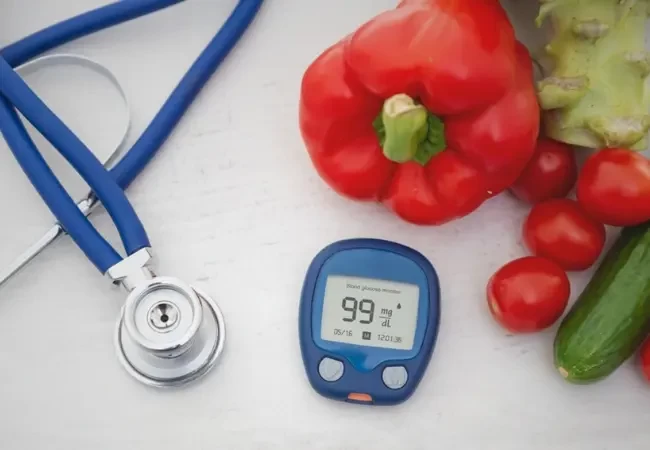Blog
Snoring
& Diabetes

Why is Snoring More Common in People with Diabetes?
 Medically reviewed by: Dr. Tom Babu, Consultant Diabetologist & Endocrinologist - Written by Jasni Salim - Updated on 24/09/2024
Medically reviewed by: Dr. Tom Babu, Consultant Diabetologist & Endocrinologist - Written by Jasni Salim - Updated on 24/09/2024Snoring can be more than just annoying. It can mean you have a serious sleep problem called obstructive sleep apnea (OSA). When someone has OSA, their breathing stops for a minute or more while they sleep. This can lead to serious health issues like heart attacks or strokes and make illnesses like high blood pressure or diabetes worse. People with diabetes often have trouble sleeping too which can include waking up frequently at night and having trouble falling asleep. Read more below to know the connection between sleep apnea and diabetes.
How Might Snoring Contribute to Diabetes?
The International Diabetes Foundation says that almost 40% of people with sleep apnea (OSA) may also have diabetes. Sleep apnea happens when your breathing gets blocked during sleep which can lead to snoring. Thus, there is a huge connection between snoring and diabetes. This blockage reduces the amount of oxygen your body gets. In response, your body makes more stress hormones like cortisol which makes it harder for your body to use insulin properly. Low oxygen levels can also harm your heart and brain health.
Could You Have an Obstruction?
Obstructive sleep apnea (OSA) is a type of sleep problem where breathing stops because something blocks the airways. People with OSA often snore. The National Institutes of Health says about 12 million Americans have this condition of snoring and diabetes. Many people with type 2 diabetes also have OSA. Research shows that the worse OSA is, the harder it can be to control blood sugar levels. If you have diabetes and notice symptoms like loud snoring, choking during sleep, being very tired during the day or difficulty focusing, you should talk to your doctor. They may suggest doing a sleep study to check if you have sleep apnea so that you can get the right help.
- Depression
- Daytime sleepiness
- Irritability
- Snoring
- Sexual dysfunction
- Feeling tired or fatigued most of the time
To find out if you have sleep apnea, you can take a test called a polysomnogram. This test checks how your body works while you sleep. It looks at things like your eye movements, brain activity, muscle control, heart rate, breathing and blood oxygen levels.
If you have sleep apnea, one way to treat it is by using a CPAP machine. This is a mask you wear over your nose and mouth while sleeping. The machine sends air to help keep your throat open so that you can breathe better. There is also a new device that can be implanted to help with sleep apnea which has been approved by health authorities.
If you also have diabetes, it is important to find out if you have sleep apnea. Managing sleep apnea can help you control your diabetes better and you will feel much better after a good night's sleep.
Sleep Apnea and Diabetes Have a Similar Sign
Sleep problems often happen to people who are overweight. Many people with sleep apnea—serious sleep issues—are also obese and a lot of them have type 1 or type 2 diabetes because of this condition. Even gaining a little weight can greatly affect a person's health and cause many problems in the body.
Lack of Sleep Might Also Cause Diabetes
Sleep apnea and diabetes are closely linked. Sleep apnea causes frequent awakenings during the night which disrupts deep sleep and affects important hormones like insulin. This can lead to higher blood sugar levels and diabetes. Similarly, not getting enough sleep can also disrupt hormones and lead to insulin resistance which make it harder for the body to manage sugar levels.
For people with type 1 diabetes, sleep problems can make it even harder to control their condition and increase the risk of developing type 2 diabetes. When someone has both sleep apnea and diabetes, it can make both conditions worse. Treating both conditions together can help improve overall health and quality of life.
Conclusion
If you have sleep apnea, remember to check your blood sugar levels. One way to feel better is by losing weight which can help you breathe more easily. Visiting a doctor for proper care can reduce your sleep apnea symptoms.
Diabetes is becoming more common in Kerala which means more people need help with it. Diabetes mainly happens due to not having enough insulin, but it can lead to other problems too. So, when choosing a hospital for diabetes care, it is important to look at their facilities to make sure they can take care of all diabetes issues. Silverline Hospital is known for having great facilities and expert doctors who focus on diabetes treatment in Kerala, India. We believe in a complete approach to treating diabetes, not just giving medicine or insulin shots. We support our patients in living healthy lives for as long as possible. Our diabetes specialists create personalized treatment plans for each patient.

More Blogs
-

Struggling with Erection or Early Ejaculation? Here's How to Get Help
Struggling with erectile dysfunction or premature ejaculation? Learn common causes, treatments, and how to seek professional help with confidence.
-

When Should Diabetics Eat? Expert Tips on Meal Timing and Blood Sugar Control
Learn how diabetics can optimize meal timing to better control blood sugar. Expert tips for healthier, more balanced living.
-

Facing the Fear: Understanding Psychological Erectile Dysfunction Before Marriage
Discover the causes and solutions for psychological erectile dysfunction before marriage. Gain insight, support, and confidence for a healthy relationship.
-

Why Overweight Individuals Should Embrace Early Dinners
Ready to lose weight smarter? See why early dinners are a game-changer for overweight individuals aiming for lasting health and weight control.
-

Overweight? Start with This One Powerful Lifestyle Change
Struggling with weight? Most of us eat our heaviest meal of the day at night, usually after 9 or even 10 PM.


 Home
Home  Booking
Booking
 Chat Now
Chat Now  Call Us
Call Us